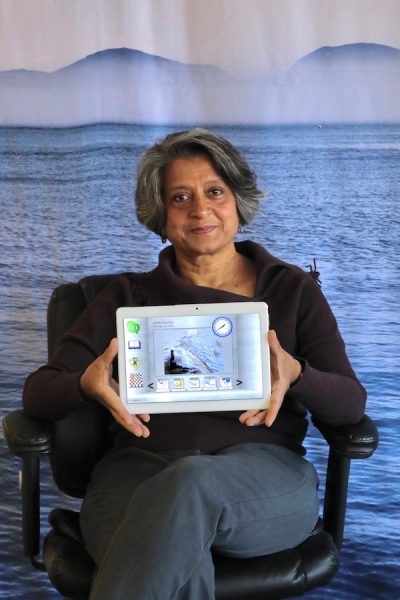
According to her LinkedIn profile, Dr. Piali De developed artificial intelligence systems for the United States defense departments.
Now Dr. De, who is a physicist, is helping older people manage chronic health conditions from home — again, using artificial intelligence (AI). In 2010, she co-founded Senscio Systems, Inc. with her husband Hugh A. Stoddart, and late father-in-law, Hugh F. Stoddart, both also physicists. Headquarters for Senscio’s Research and Development team is in Boxborough, Massachusetts. Operations is based in Scarborough, Maine.
Their collaboration began when her father-in-law developed congestive heart failure and had a heart valve replacement, followed by an infection. He discovered first hand that people with chronic health conditions often have to grapple with a complicated healthcare industry. Out of his health challenges, Senscio was born.
In the early years, the company focused on developing its AI technology and later developed the Ibis Health Management System. People who enroll in the Ibis program are given tools and resources to help them self-manage their chronic health conditions.
Enrollees get a tablet about the size of an iPad (called Ibis) to log information about their health, including whether they took their medications or made and/or followed through on medical appointments. It also gives prompts about checking blood pressure, monitoring temperatures, etc. In addition, it can be used to monitor symptoms, such as any related to COVID-19. All of the information immediately analyzed by AI and if something is not right, the person will receive information about what they should do next and their care provider is notified. You can read more about Senscio and Ibis on their websites.
I was recently contacted by a representative of Senscio to see if I’d be interested in writing a blog post about the Ibis program. I thought it was definitely a worthwhile topic and gave Dr. De the opportunity to put something in her own words, not only about Ibis but also about how she was coping with the pandemic on a personal level.
This is what she had to say:
Most of our adult lives are days filled with work, worry, and responsibilities. As we live past those responsibilities, we earn ourselves the time to enjoy unhurried moments with loved ones, reflect on a life well-lived, continue to contribute to the well-being of others, and take pride in being in control. As a Maine-based company, I co-founded Senscio Systems with the belief that with purposefully designed technology, aging can be made simpler, more under control, and more joyful.
It is hard to imagine a better state than Maine to utilize our technology-enabled aging solutions. Maine is rural with limited access to facility-based healthcare. Mainers are fiercely independent, proud, and undeterred by hard work. Maine also has the oldest median age. At the same time, Maine lacks the workforce needed to support older Mainers in its traditional manner; new ways are needed. We imagined that the new way would include efficient virtual care that is delivered into the home through technology. A new workforce will be developed to deliver virtual care, not just to Mainers but also to folks anywhere. And this new workforce could be trained by Maine’s excellent academic centers who are educating tomorrow’s healthcare workforce. All combined, the more we worked in Maine, the more compelling it became to test and evolve our technology-enabled aging solutions in Maine and to build our service workforce here.
The role the Ibis device can play in helping Maine seniors, how it works
One of the many things I have learned from working with seniors is they take pride in being in charge, learning new things and finding new connections. When we created the Ibis program, we wanted to honor these attributes and build a healthcare program that makes life easier. Our unique technology-powered Ibis program does so by helping our members successfully complete their daily health checklist, which includes taking medicine, measuring vitals, or monitoring symptoms. With the help of Ibis, seniors can be confident in their self-care and spend more time doing things they enjoy.
We designed the Ibis program to be easy, fun, and indispensable. At the start of their Ibis experience, the new member receives a custom monitoring kit to track their daily health, including indicators of COVID-19. The Ibis solution supports persons with a wide range of complex chronic conditions, such as COPD, diabetes, depression, and heart disease.
The artificial intelligence within Ibis accomplishes three key functions:
~First, the AI “guides” the member to perform health tasks at the right time and in the right way. This can range from eating breakfast to physical therapy, taking prescription medications and monitoring symptoms.
~Second, the AI recognizes deviations from baseline health established by the member’s physician based on self-assessment data entered by members. Ibis reports those trends to the clinical care team, informing chronic health management decisions.
~Third, the AI maintains a limitless recollection of the member’s self-assessment data, allowing the clinical care team to leverage that history in making care decisions for the member.
What’s also important, however, is that Ibis maintains a “personal” touch. Each member is given a “Member Advocate” to support self-management efforts. This Member Advocate essentially serves as a health coach and Ibis liaison between the member and their medical professionals in their personal care team. This includes an Ibis-provided chronic care specialist and the member’s primary care provider, if needed. This key service gives the member easier and informed access to the clinical care that they may need from time to time.
We all need to stay safe: Next steps for Maine to address senior living communities and stop the spread, including contact tracing
To keep older Mainers safe during this pandemic, we need to focus on senior-living communities, especially congregate independent housing. More than half of Maine’s deaths from the COVID-19 pandemic have taken place in congregate housing. As Maine’s economy opens up and families resume visits, the risk of the virus lingering in frequently-visited areas will rise and pose a renewed threat to residents.
Mainers who live in senior housing facilities must be extra careful in protecting themselves from the coronavirus. This means keeping track of symptoms on a daily basis so that they can stay on top of key health indicators that suggest deteriorations. The sooner those deteriorations are spotted, the sooner they can be addressed by medical professionals. The AI-powered Ibis device provides key insight into these deteriorations and can offer lifesaving support.
Another important tool in keeping older Mainers safe is contact tracing. Maine’s goal is to recruit 100 contact tracers, who serve as “detectives” monitoring the spread of the coronavirus. These contact tracers keep tabs on people who have contracted the virus and then isolate them to stop further contraction, preventing mass outbreaks. Contact tracers end up creating a map of how COVID-19 is getting transmitted, asking infected people about their contacts—and the contacts of those contacts. The Ibis Program can track the infected back to those who visit senior housing, making it possible to limit visitation on an individual basis to keep all residents in a senior housing safer.

How seniors can gain independence
While contact tracing slows the spread, the most effective deterrent against the coronavirus is individual responsibility. Seniors enjoy being independent and the Ibis program encourages independence by putting the member more in charge of their own health. Now more than ever, hospitals have a lot on their plate. Doctors and nurses cannot take care of us all, so we need to manage our own health to the best of our ability.
Senior citizens are particularly vulnerable to infectious diseases, making self-management all the more crucial. That job is made infinitely easier with an Ibis device, which is being offered to elderly individuals with Medicare Part B at no cost. The first step for interested parties is to request an Ibis device and initiate enrollment via a Member Advocate at IbisProgram.com.
Seniors who qualify for the program will receive a “COVID-19 Response Kit” in the mail, including a tablet, thermometer, pulse oximeter for measuring oxygen in the blood, and relevant instructions. Recipients will then be able to monitor their temperature, oxygen level, and other health indicators, in addition to having access to a Member Advocate and a chronic care specialist (or consultant). The Member Advocate will raise a red flag about any of the patient’s holistic health qualities, coordinating with the chronic care specialist and that member’s primary care provider, as needed.
Personal reflection
This pandemic has caused us all to take a good look at what matters. In some ways, my life slowed down because I am no longer driving from one meeting to another. But in another way, my life took on a new urgency because I can no longer take lightly the impact of our work. Every day, I wake up with heavy shoulders knowing that we are key to emerging out of the grim present. We critically matter on two accounts: keeping our vulnerable populations safer, and creating good jobs that heal our broken health system. I meditate every day to calm my mind and to check my impatience. I discuss my thoughts with my family and colleagues – looking to them to tell me if we should slow down or be more measured. As a day wraps up, I reflect on the good that we were able to do on that day and I try not to dwell on what more we could have done. The future will come to us in due time. Knowing that we are working systematically has kept me from feeling frustrated. Having a purpose and a clear path forward has kept me focused, energized, and grateful. These uncertain times have shown me the importance of being connected with those we trust, in honoring everyone’s work, and to bring everyone along on the journey to heal. I remind myself that everyone is dealing with uncertainties in their own way – shaped by their past and personalities. We cannot understand, nor can we judge, anyone’s behavior during these stressful times. All we can do is accept each other unconditionally and with love. This too shall pass.
Piali De, CEO of Senscio Systems

Leave A Comment